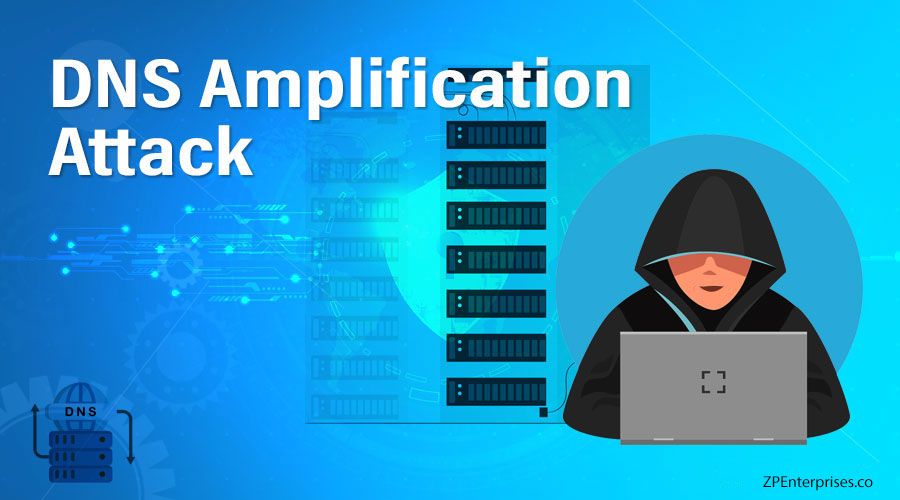DNS amplification is a DDoS attack that leverages DNS resolvers to overwhelm a victim with traffic.
What is a DNS amplification attack?
This DDoS attack is a reflection-based volumetric distributed denial-of-service (DDoS) attack in which an attacker leverages the functionality of open DNS resolvers to overwhelm a target server or network with an amplified amount of traffic, rendering the server and its surrounding infrastructure inaccessible.
How does a DNS amplification attack work?
All amplification attacks exploit a disparity in bandwidth consumption between an attacker and the targeted web resource. When the gap in cost is magnified across many requests, the resulting traffic volume can disrupt network infrastructure. The malicious user can get more from less by sending small queries that result in significant responses. By multiplying this magnification by having each bot in a botnet make similar requests, the attacker is both obfuscated from detection and reaping the benefits of significantly increased attack traffic.
A single bot in a DNS amplification attack can be thought of in the context of a malicious teenager calling a restaurant and saying, “I’ll have one of everything; please call me back and tell me my whole order.” The targeted victim’s phone number is given when the restaurant asks for a callback number. The target then receives a call from the restaurant with a lot of information they didn’t request.
As a result of each bot making requests to open DNS resolvers with a spoofed IP address, which has been changed to the actual source IP address of the targeted victim, the target then receives a response from the DNS resolvers. To create a large amount of traffic, the attacker structures the request in a way that generates as significant a response from the DNS resolvers as possible. As a result, the target receives an amplification of the attacker’s initial traffic, and their network becomes clogged with the spurious traffic, causing a denial-of-service.

A DNS amplification can be broken down into four steps:
- The attacker uses a compromised endpoint to send UDP packets with spoofed IP addresses to a DNS precursor. The spoofed address on the packets points to the real IP address of the victim.
- Each one of the UDP packets requests a DNS resolver, often passing an argument such as “ANY” to receive the most significant response possible.
- After receiving the requests, the DNS resolver, which is trying to be helpful by responding, sends a significant response to the spoofed IP address.
- The IP address of the target receives the response, and the surrounding network infrastructure becomes overwhelmed with the deluge of traffic, resulting in a denial of service.
While a few requests are insufficient to take down network infrastructure, when this sequence is multiplied across multiple requests, and DNS resolvers, the amplification of data the target receives can be substantial.
How is a DNS amplification attack mitigated?
Mitigation options are limited for an individual or company running a website or service. This comes from the fact that the individual’s server, while it might be the target, is not where the main effect of a volumetric attack is felt. Due to the high amount of traffic generated, the infrastructure surrounding the server feels the impact. The Internet Service Provider (ISP) or other upstream infrastructure providers may not be able to handle the incoming traffic without becoming overwhelmed. As a result, the ISP may blackhole all traffic to the targeted victim’s IP address, protecting itself and taking the target’s site offline. Aside from offsite protective services like Cloudflare DDoS protection, mitigation strategies are mostly preventative Internet infrastructure solutions.
Reduce the total number of open DNS resolvers
An essential component of DNS amplification attacks is access to open DNS resolvers. By having poorly configured DNS resolvers exposed to the Internet, all an attacker needs to do to utilize a DNS resolver is to discover it. Ideally, DNS resolvers should only provide their services to devices that originate within a trusted domain. In the case of reflection-based attacks, the open DNS resolvers will respond to queries from anywhere on the Internet, allowing the potential for exploitation. Restricting a DNS resolver to only respond to queries from trusted sources makes the server a poor vehicle for any amplification attack.
Source IP verification – stop spoofed packets leaving the network
Because the UDP requests sent by the attacker’s botnet must have a source IP address spoofed to the victim’s IP address, a key component in reducing the effectiveness of UDP-based amplification attacks is for Internet service providers (ISPs) to reject any internal traffic with spoofed IP addresses. If a packet is being sent from inside the network with a source address that makes it appear as if it originated outside the network, it’s likely a spoofed packet and can be dropped. ZP Enterprises highly recommends that all providers implement ingress filtering and at times, will reach out to ISPs who are unknowingly taking part in DDoS attacks and help them realize their vulnerability.
How does Cloudflare mitigate DNS amplification attacks?
With a properly configured firewall and sufficient network capacity (which isn’t always easy to come by, it’s trivial to block reflection attacks such as DNS amplification attacks. Although the attack will target a single IP address, our Anycast network will scatter all attack traffic to the point where it is no longer disruptive. During a recent six-month window, our DDoS mitigation system “Gatebot” detected 6,329 simple reflection attacks (that’s one every 40 minutes), and the network successfully mitigated all of them.





